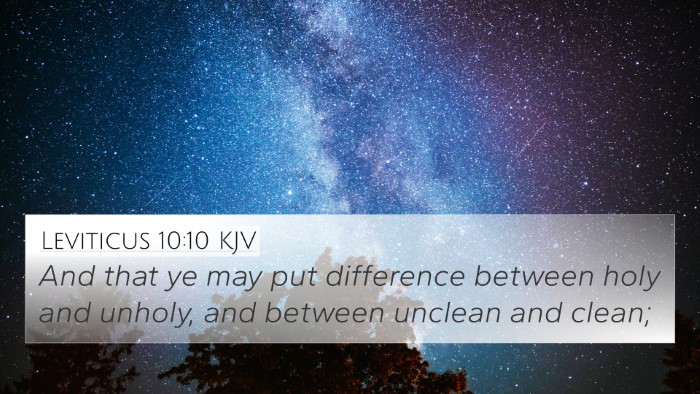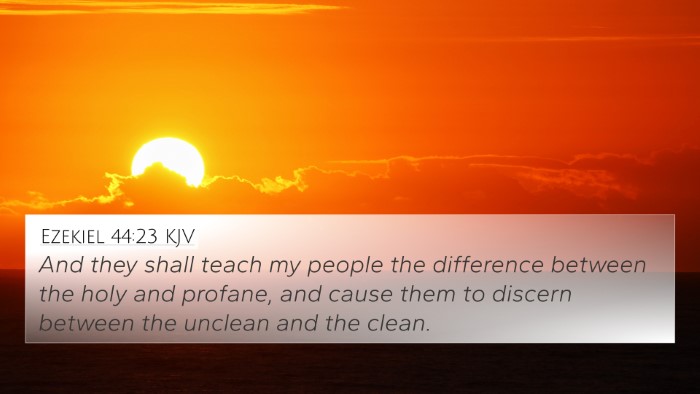Understanding Leviticus 11:47
Leviticus 11:47 states: "To make a difference between the unclean and the clean, and between the beast that may be eaten and the beast that may not be eaten." This verse provides an important principle regarding the dietary laws given to the Israelites. In this passage, God emphasizes the need for His people to distinguish between what is pure and impure, which reflects deeper spiritual truths.
Summary of the Verse's Meaning
The significance of Leviticus 11:47 lies in its representation of holiness and separation, key themes throughout the Bible. God instructs His covenant people to be mindful of their practices, particularly those related to food, which serve both practical and symbolical purposes.
Insights from Public Domain Commentaries
- Matthew Henry: Suggests that the dietary laws not only pertain to physical purity but also symbolize moral and spiritual distinctions between good and evil. He argues that this command was aimed at teaching the Israelites to maintain holiness in all aspects of their lives.
- Albert Barnes: Comments on the necessity of separating clean from unclean as a sign of obedience to God. He highlights that these laws were to instill discipline among the Israelites and remind them of their distinct identity as God’s chosen people.
- Adam Clarke: Emphasizes the educational aspect of these laws and how they served to maintain a national identity. Clarke notes that understanding which animals are clean contributes to the spiritual state of the nation, reinforcing fidelity and reverence towards divine governance.
Thematic Biblical Connections
Leviticus 11:47 can be cross-referenced with several important scriptures that deepen our understanding of the themes of purity, dietary laws, and God’s expectations for His people:
- Genesis 7:2: God instructed Noah to take clean animals for sacrifice.
- Deuteronomy 14:3-21: Further elaboration on clean and unclean animals, showing the continuity of this teaching.
- Matthew 15:11: Jesus states that it is not what goes into the mouth that defiles a person, indicating a shift towards spiritual rather than ritualistic purity.
- Acts 10:14: Peter receives a vision declaring all foods clean, suggesting that the distinction is not merely dietary but contingent upon grace through faith.
- 1 Peter 1:16: "Be holy, for I am holy," reinforcing the idea that God expects His people to embody His holiness in every aspect of life.
- Romans 12:1-2: Calls believers to present themselves as living sacrifices, which reflects the intentionality behind choosing what is clean and pure.
- Hebrews 9:9-10: Discusses the symbolic nature of the Old Covenant laws and points towards a greater reality in Christ.
Conclusion
Leviticus 11:47 serves as a reminder that God is concerned with both physical and spiritual purity among His people. By understanding and applying the lessons from this verse, believers today can navigate their faith with a sense of purpose and identity guided by divine standards.
Tools for Bible Cross-Referencing
To deepen your understanding of Leviticus 11:47 and its connections with other scriptures, utilize tools like a Bible concordance or a cross-reference Bible study guide. These resources can help uncover the intricate web of thematic Bible verse connections that span across the Testaments.
Methodology for Cross-Referencing
When exploring cross-referencing Bible study methods, consider the context of each verse, look for repeated themes, and analyze parallel teachings in both the Old and New Testaments. This comprehensive approach can lead to richer insights into God's Word.







